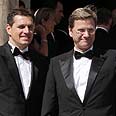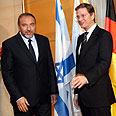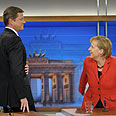


This has been a difficult time for German Foreign Minister Guido Westerwelle. One bright spot in the gloom was when he married his partner Michael Mronz in September. The wedding ceremony was discreet and held in the presence of family members. Westerwelle is very careful about separating his private life and political activities.
Just a year ago, Westerwelle was considered a star in Germany's political world, when the liberal party he leads, the FDP (Free Democratic Party), won the general elections with the best election results in the party's history and became a senior partner in Chancellor Angela Merkel's right-wing government.
Today the party is struggling in the polls and barely making the political threshold of 5%, while Westerwelle himself is fighting for his position as leader of a party whose ranks are filled with discontent over his leadership.
And as if all that weren't enough, a few days ago Westerwelle received a study compiled by a committee of historians revealing just how deeply the German foreign ministry was involved in the Holocaust of Europe's Jews, and how it aided fleeing Nazis at the end of the war.
The committee's verdict is clear: The foreign ministry operated very similarly to a crime syndicate during WWII, and was an active partner in every step of the persecution, expulsion and genocide of Europe's Jews.
The historians who wrote the report added that after the war, the foreign office rewrote its own history and presented itself as standing "in opposition to Nazism".
In his first interview to an Israeli newspaper since becoming foreign minister, Westerwelle speaks out over the conclusions of the study that caused a public storm in Germany. The interview was held ahead of Westerwelle's official visit to Israel at the invitation of Foreign Minister Avigdor Lieberman. During the visit, Westerwelle will also be visiting Gaza.
"The German foreign ministry's image as a stronghold of Nazi opposition was amended years ago through various publications," Minister Westerwelle said. "What makes the historical committee's study unique is the profusion of appalling new details. The study hints that after Hitler's rise to power, the foreign ministry adapted itself overnight to the new reality. It's a shocking revelation".
As German foreign minister, how do you feel about the study's conclusions?
I was appalled when I read it. Without sparing criticism, it presents the depth of the foreign ministry's connections with the Nazi regime's violent policies. The ministry and many of its employees carry a burden of guilt from the Nazi reign. It's disgraceful."
Some of the committee members claimed that they weren't given free access to the foreign office archives. Do you support complete transparency and additional research?
"The committee examined a large number of personal files and studied documents which were previously considered classified. That said, I take the committee's criticism over the archival work very seriously, since I know that many researchers use the archive. We will take necessary steps where needed. We need transparency and openness in order to work through our past."
A history of violence
The German foreign ministry is considered a fortress of great political power, which is why traditionally, it is the leader of the second largest party in the coalition who is appointed as its chief. Many FDP party leaders who came before Westerwelle held the same position. At least two of Westerwelle's predecessors, foreign ministers Walter Scheel and Hans-Dietrich Genscher, were also registered members of the Nazi party.
Genscher, one of Germany's greatest foreign ministers and Westerwelle's spiritual guide, claimed that he was registered to the Nazi party without his knowledge. In Israel he is remembered as an unfriendly minister who had close ties with the Arabs. The historians' committee noted that it received no cooperation from previous FDP foreign ministers.
"It's a fact that diplomats from the Nazi era took part in the reconstruction of the German foreign ministry after the war. The FDP, like the rest of the democratic parties in Germany, supports clear and thorough research of the past," Westerwelle said.
Is there still anti-Semitism in the German foreign ministry?
"The historians' committee is clear proof that the foreign ministry and its employees deal plainly and without embellishment with our burdensome past."
The committee was commissioned in 2004 by then-Foreign Minister Joschka Fischer of the Green Party, after a dispute that broke out between Fischer and some foreign ministry employees over an obituary published in a ministry leaflet for a diplomat who served as a Nazi prosecutor in his past.
Fischer immediately decided to forbid the publication of obituaries of diplomats with a Nazi past. On the eve of the publication of the historians' study, Westerwelle decided to reverse Fischer's decision, a move which caused a great deal of criticism.
"The question is how does the foreign ministry, in light of its past, deal with obituaries of its past employees," explains Westerwelle. "From my point of view the answer is clear: Nazis won't receive any respect. At the same time, in a law abiding country we must act towards people with a sense of justice.
"And so, out of our wish to respect the memory of the dead we must find a respectful memorial for those who were innocent. In cases where there is a shred of doubt, we will involve external experts."
One of Westerwelle's greatest political achievements is Germany's reelection to the UN Security Council for a period of two years, at a time when fateful and critical decisions will be made with regards to Iran's nuclear plan. Germany is a member of the six nations which handle the negotiations with Iran on behalf of the international community.
"Germany has been involved in global peace efforts, security and international development for decades", said Westerwelle. "We are the third largest financer of the UN, and one of the leaders in sending soldiers to UN forces. The next two years in the UN Security Council will allow us to work towards peace and security in an efficient way.
"This goes for issues of disarmament, prevention of nuclear arms distribution and other issues of global importance like climate change. We are working on making the next decade the decade of nuclear disarmament rather than a race for nuclear arms. Part of that is making sure that Iran won't have the option of obtaining nuclear weapons. And of course, we will address the Middle East peace process."
According to the information you have, are the sanctions against Iran affective? Should they be strengthened? If so, how?
"Just recently both the UN Security Council and the EU massively increased the sanctions on Iran. The sanctions are a clear signal to the Iranian leadership that it must resume negotiations. It is as yet not possible to evaluate the affect of the sanctions.
"That said, it should be noted that the Iranian leadership has just stated its readiness to resume talks. We are interested in serious and to the point negotiations on the Iranian nuclear program. Iran would be wise to take advantage of this opportunity."
Negotiations with Iran have yet to bear fruit, why would additional negotiations make a difference?
"I have the impression that the international community's determined stance was received with due seriousness in Iran."
A delegation from the Bundestag and the FDP recently travelled to Iran. Don't you think that these official exchanges give the Iranian regime undeserved legitimacy?
"The Bundestag delegates take personal responsibility for where and when they visit; they are in no way committed to the government's policy."
What is the German government's policy on the subject?
"As foreign minister I don't allow myself to publicly advice another constitutional body".
In appreciation of Lieberman
What does the special relationship between Germany and Israel mean to you?
"In light of our history, we have a special commitment towards Israel: From our point of view, Israel's security is non-negotiable. The calamity embodied in the Holocaust must never be forgotten. That is why I consciously chose to start my official visit to Israel as German foreign minister at Yad Vashem.
"Today we have a close political relationship and the connections between the citizens of the two countries are increasing rapidly. We must work to build the relationship, and that is another issue I will address on my upcoming visit."
How can the relationship be developed further?
"By actively preparing for the soon-to-be-held third inter-governmental consultation between Germany and Israel. The special relationship with Israel allows us, among other things, to discuss disagreements over the peace process openly, as friends and partners.
"We believe this includes a gesture on the settlement issue, in accordance with the roadmap and also improving the humanitarian situation in the Gaza strip. This is why I will make efforts to get approval for Gaza exports."
And the Palestinians, will they have to make gestures?
"We are working with both sides to achieve a constructive attitude."
Do you accept Prime Minister Netanyahu's demands for the Arab world's recognition of Israel as a Jewish State?
"Today's Israel is influenced without a doubt by its democratic and Jewish traditions. Implementing the two-state solution will serve Israel's wish to keep those traditions."
So Germany accepts the idea of Israel being now and in the future a Jewish State?
"We want Israel to keep its Jewish and democratic character within the framework of a just and peaceful solution."
Will a unilateral Palestinian declaration of statehood promote the peace process?
"A unilateral declaration of statehood will not get us closer to total and stable peace. There is no alternative to a solution achieved through negotiation. Yet we must be determined in working to achieve it."
Are you satisfied with US President Obama's performance in the Middle East?
"I appreciate President Obama's personal commitment to achieving peace in the Middle East. His impressive speech in Cairo, at the beginning of his term, sent the right message. He is relying on the courage and determination of both the Israelis and the Palestinians, so that the two-state solution will become a reality. At the same time, his government is enlisting the neighboring countries, without whom permanent peace in the region would be unthinkable."
Four years after the Second Lebanon War, Hezbollah is armed as it never was before. There is no doubt whatsoever that the international community completely failed when it comes to Lebanon. What lessons have you learned from the situation?
"The Security Council has, as per Israel's request, recently renewed UNIFIL's mandate for an additional year. The government of Israel also requested the continued presence of German troops in the peacekeeping force. We remain committed.
"Of course the situation in Lebanon is no simple, but, it doesn't have a military solution. We must do everything we can to develop stability and peace in the country. We will continue to invest efforts in order to achieve that goal."
You have met your Israeli colleague Avigdor Lieberman a number of times, what is your impression of him?
"We work well together and appreciate each other on a personal level, even if we disagree upon occasion."
- Follow Ynetnews on Facebook















